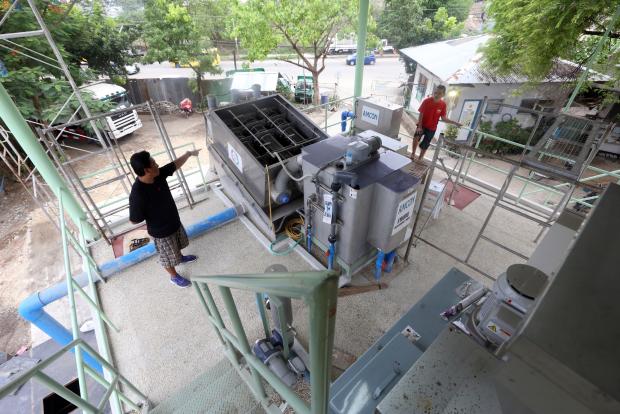
FULL BLAST. The septic treatment plant seen here being inspected by representatives of the Japan International Cooperation Agency (JICA) will be fully operational on Thursday this week. (CDN PHOTO. TONEE DESPOJO)
With Cebu City’s septic treatment plant (STP) going full blast on Thursday this week, the city government expects private septic haulers to stop dumping untreated waste in the city’s rivers and other waterways.
“(With the formal opening of) the pilot facility on June 26 and the passage of the septage management ordinance, we now have a clear and appropriate way of treating septic waste,” Councilor Nida Cabrera said.
The city government’s P15 million septic treatment plant (STP) at the North Reclamation Area was donated by the Japan International Cooperation Agency (JICA) and Japanese company Amcon Inc.
The plant has been on a test run for more than a month now.
The ordinance authored by Cabrera and Councilor Sisnio Andales, was passed by the Cebu City Council in compliance with the Philippine Clean Water Act of 2004 or Republic Act 9274.
Improvement
“Most of the septic tanks in the Philippines are only emptied when they overflow and many have open bottom thus allowing seepage of waste water to the ground which eventually contaminate ground water,” the ordinance stated.
The Philippine Clean Water Act mandates local government units to prepare a program on septage management and to share in the management and improvement of water quality within their respective territorial jurisdictions.
The law also mandates the LGUs to appropriate the necessary land, including the required rights-of-way or road access to the land, for the construction of the sewage and septage management facilities.
Four private septic haulers have been disposing their collected septic wastes at the plant for free.
With the passage of the ordinance, the city will start collecting tipping fees from them, said Cebu City Environment and Natural Resources Office (CCENRO) chief Randy Navarro.
Tipping fees
The CCENRO will enforce the ordinance and facilitate the development of the City’s Septage Management Program that will be submitted to the mayor within six months.
“We haven’t been collecting tipping fees, we still have to meet (today). But the collection will range from P200-P250 per cubic meter as recommended by the Solid Waste Management Board (SWMB),” Navarro said.
The STP separates dirty liquid and the sludge from septic tanks.
The liquid is then treated before it is disposed while the sludge is converted into a sludge cake. The sludge cake is used for composting.
Navarro said four private haulers – Cabras, Johny, Yap and Monteclar – are recognized by the Cebu City government since they’ve been paying the city from 2007 to 2011 for feeding a PhilBio project at the Inayawan Landfill.
Capacity
Payment stopped when the mayor ordered the landfill’s closure last December 2011.
Households and business establishments have been paying these haulers to collect their waste.
But Navarro said there’s no proper monitoring on the manner of disposal of the collected waste.
He said Cabras has six trucks with a capacity of six cubic meters each and charges P1,800 per truck.
The same amount is collected by Johny which has three trucks with a capacity of six cubic meters per truck.
Accredited
Yap has four trucks with a capacity of six cubic meters each and charges P1,800 per truck.
Monteclar has two trucks at a capacity of four cubic meters each and charges P2,500.
With the passage of the ordinance, private haulers have to be accredited by the SWMB or the Cebu City Septage Management Board (CCSMB) created by the ordinance.
The CCSMB will be responsible for administering and coordinating or regulating the implementation of the Cebu City Septage Management Plan. It is chaired by the mayor.
Under the ordinance haulers are required to present a Manifest Receipt from the CCSMB when transporting domestic sludge and septage to the STP.
Prohibited
The receipt states the origin of the waste, date and time of collection and volume among others.
Septic haulers are prohibited to transport septage without the Manifest Receipt.
Other prohibited acts include failure to secure accreditation, improper disposal of waste and failure to submit regular reports to the CCENRO.
Households without toilets and septic tanks or construction of residential, commercial, industrial or institutional buildings without toilet facilities are also prohibited.
Violators will be fined P1,000 at first offense, P3,000 for second offense.
Communal
Third-time violators will be fined P5,000 and will also be penalized with cancellation of the accreditation and imprisonment at the discretion of the court.
The ordinance also mandates that every house used for habitation shall have a sanitary toilet which must be approved by the City Engineer or the Building Official.
In areas with houses of light materials or are temporary in nature and close to one another, barangays may develop a communal excreta disposal system or other affordable alternative sanitation technologies as approved by the Department of Health.
Following the Department of Health (DOH) manual, there must be mandatory de-sludging of septic tanks every three years or when the tank is half-full of sludge.
Households with less than 10 members shall de-sludge every five years.
Construction of new septic tanks requires a septic permit to be issued by the city government.
Septic tanks built prior to the ordinance’s approval are given two to three years to comply with the requirements set by the law.